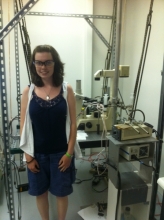
University:
Major:
Mentor(s):
Faculty Sponsor(s):
Faculty Sponsor's Department:
Project Title:
Project Description:
Droplet coalescence has huge implications in the food and cosmetics industry with regards to emulsions such as salad dressings and shampoos. The length of time that emulsions will stay mixed, as drops suspended in a second liquid, until they coalesce and combine to form two separate layers can be predicted by measuring the drainage time. The drainage time is the time required for two drops to coalesce once they have come into contact, which can range from milliseconds to days depending on the system. In order to study the drainage time, a Cantilevered – Capillary Force Apparatus has been developed. Firstly, the apparatus was validated by examining the interaction between micron sized PMMA beads, then millimeter sized metal spheres and lastly glass spheres, all in fluids of varying properties. The attractive forces involved were measured by pushing together and then moving apart two spheres at different velocities. Apart from the metal spheres, the measured interaction force agrees well with the theoretical prediction. The interaction force between the PMMA spheres proved too small to be measurable, but the data still agree well with the theory. The metal spheres, in varying fluids, demonstrated extremely large interactive forces which were much greater than expected. This is likely due to the presence of an unanticipated magnetic interaction. The glass beads showed a measureable attractive force that scales with the viscosity of the fluid as predicted by the theory. After validating the apparatus, the interaction force between two droplets were measured for a multinational company. In future work this apparatus will be used to work with droplets to study coalescence.
